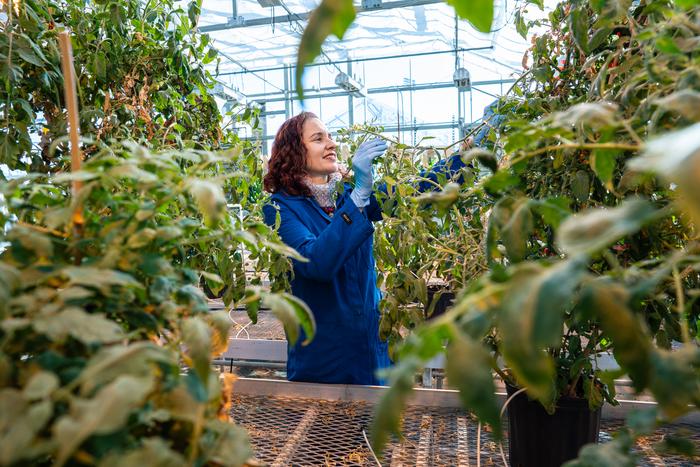iobhan Brady, a professor in the Department of Plant Biology and Genome Center at the University of California, Davis, has been selected as a Howard Hughes Medical Institute (HHMI) Investigator. The prestigious Investigator program, which Brady describes as “life changing,” will provide her with roughly $9 million in research support over a seven-year term, with the option to renew.

Credit: TJ Ushing, UC Davis
iobhan Brady, a professor in the Department of Plant Biology and Genome Center at the University of California, Davis, has been selected as a Howard Hughes Medical Institute (HHMI) Investigator. The prestigious Investigator program, which Brady describes as “life changing,” will provide her with roughly $9 million in research support over a seven-year term, with the option to renew.
Brady’s research aims to understand how plants use their roots to respond to environmental stressors, and to use this information to develop plants that are better able to respond to climate change. To do this, Brady’s lab employs a range of techniques, from genomic and cellular analysis to evolutionary comparisons. With HHMI’s support, she will be able to expand her research scope to explore roots in new and boundary-pushing ways.
“It’s the kind of opportunity that will allow me to do really bold science—high-risk, high-reward research,” Brady said. “I actually couldn’t believe it was real. It was only after I read it out to my husband that I was like, okay, now it’s really real.”
Brady joins two other HHMI Investigators at UC Davis—Neil Hunter in the Department of Microbiology and Molecular Genetics and Jorge Dubcovsky in the Department of Plant Sciences.
The root of the problem
Brady has been fascinated by plant roots since she was in graduate school, when she spent hours poring over them with a microscope. Roots are the primary mechanism by which plants obtain water and nutrients, but researchers still know relatively little about the cells, molecules, and genes that are involved in these processes outside of the most researched plant species.
“Roots are intricate and beautiful, and they have all of these secrets that we want to unlock,” Brady said. “There are so many root features that we know exist, but we still have no idea how they’re made or what they do.”
Brady hopes to develop a toolbox of resources that will help deepen our understanding of how plants have evolved to respond to dynamic environments. These include changes in nutrients, water availability as well as the presence of other helpful and harmful organisms. Once understood, scientists can apply this information to the creation of plants that are more resilient to climate change.
“My lab focuses on systematically uncovering the genetic programs that are responsible for where, when, and how these cell types and their walls are formed, and how they function in relation to the environment,” Brady said. “Our ultimate goal is to mitigate the havoc that climate change is already wreaking on our planet.”
The opportunity to grow (and put down roots)
Unlike other sources of research funding, the HHMI Investigator program funds “people, not projects,” which means that Brady will be able to pursue multiple research avenues simultaneously, and to develop long-term projects that would be beyond the lifespan of a typical funding cycle.
Brady is eager to incorporate new techniques and technologies into her lab’s research, including engineering and biomaterials research, to grow her team, and to explore research questions and plant systems that were previously inaccessible.
“I get to dream and put together a really great group of people who can delve into new, bold questions,” Brady said.
Being an HHMI Investigator also opens up opportunities for Brady to network and collaborate with other Investigators, who include world-renowned researchers at over 60 US institutions. Once a year, she—and one graduate or postdoctoral trainee from her lab—will have the chance to attend an HHMI research meeting.
“These meetings will be an amazing opportunity for us to have conversations and network and collaborate with a really incredible group of researchers who do very different and out-of-the-box research,” Brady said.
Brady is grateful for the support of her lab group and colleagues at UC Davis, without whom she says she would never have been granted this opportunity.
“The work I do is only possible because of the people in my lab and their ideas and how hard they work,” said Brady. “It also wouldn’t have been possible without the university’s support and the collegial environment that I’ve been lucky to grow and thrive in.”



